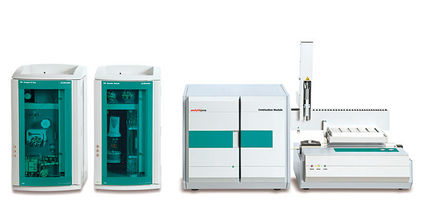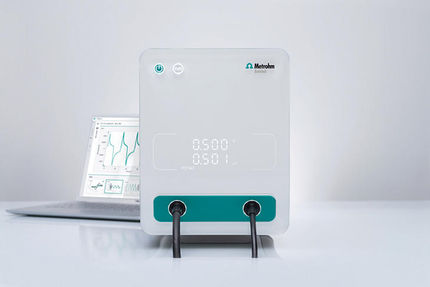Hypophosphatemia
Classification & external resources
|
|
| Phosphate group chemical structure
|
| ICD-10
| E83.3
|
| ICD-9
| 275.3
|
| DiseasesDB
| 6503
|
| MedlinePlus
| 000307
|
| eMedicine
| med/1135
|
Hypophosphatemia is an electrolyte disturbance in which there is an abnormally low level of phosphate in the blood. The condition has many causes, but is most commonly seen when malnourished patients (especially chronic alcoholics) are given large amounts of carbohydrates, which create a high phosphorus demand by cells, removing phosphate from the blood (refeeding syndrome).
Because a decrease in phosphate in the blood is sometimes associated with an increase in phosphate in the urine, the terms hypophosphatemia and "phosphaturia" are occasionally used interchangeably; however, this is improper since there exist many causes of hypophosphatemia besides overexcretion and phosphaturia, and in fact the most common causes of hypophosphatemia are not associated with phosphaturia.
Common causes of hypophosphatemia
- Refeeding syndrome This causes a demand for phosphate in cells due to the action of phosphofructokinase, an enzyme which attaches phosphate to glucose to begin metabolism of this. Also, production of ATP when cells are fed and recharge their energy supplies, requires phosphate.
- Respiratory alkalosis Any alkalemic condition moves phosphate out of the blood into cells. This includes most common respiratory alkalemia (a higher than normal blood pH from low carbon dioxide levels in the blood), which in turn is caused by any hyperventilation (such as sepsis, fever, pain, anxiety, drug withdrawal).
- Alcohol abuse Alcohol impairs phosphate absorption, and alcoholics are also after malnurished with regard to minerals. In addition, alcohol treatment is associated with refeeding, and the stress alcohol withdrawal may create respiratory alkalosis, which exacerbates hypophosphatemia (see above).
- Malabsorption This includes GI damage, and also failure to absorb phosphate due to lack of vitamin D, or chronic use of phosphate binders such as sucralfate, aluminum-containing antacids, and (more rarely) calcium-containing antacids.
- Hyperexcretion of phosphate in the urine (phosphaturia). This includes excess excretion from renal dysfunction, and also the action of many classes of diuretics. Additionally, both primary and secondary hyperparathyroidism causes hyperexcretion of phosphate in the urine.
Other rarer causes include
- Certain blood cancers such as lymphoma or leukemia
- hereditary causes
- hepatic failure
Pathophysiology
Hypophosphatemia is caused by the following three mechanisms:
- Inadequate intake (often unmasked in refeeding after long-term low phosphate intake)
- Increased excretion (e.g. in hyperparathyroidism)
- Shift from extracellular to intracellular space (seen in treatment of diabetic ketoacidosis, refeeding, short-term increases in cellular demand (e.g., hungry bones syndrome) and acute respiratory alkalosis)
Major signs and symptoms
- Muscle disfunction and weakness. This occurs in major muscles, but also may manifest as: diplopia, low cardiac output, dysphagia, and respiratory depression due to respiratory muscle weakness.
- Mental status changes. This may range from irritability to gross confusion, delirium, and coma.
- White cell disfunction, causing worsening of infections
- Instability of cell membrates due to low ATP levels: this may cause rhabdomyolysis with increased CPK, and also hemolytic anemia.
Treatment
Standard intravenous preparations of potassium phosphate are available and are routinely used in malnurished patients and alcoholics. Oral supplementation also is useful where no intravenous treatment is available. Historically one of the first demonstrations of this was in concentration camp victims who died soon after being refed: it was observed that those given milk (high in phosphate) had a higher survival rate than those who did not get milk.
See also
| Metabolic pathology / Inborn error of metabolism (E70-90, 270-279) |
|---|
| Amino acid | Aromatic (Phenylketonuria, Alkaptonuria, Ochronosis, Tyrosinemia, Albinism, Histidinemia) - Organic acidemias (Maple syrup urine disease, Propionic acidemia, Methylmalonic acidemia, Isovaleric acidemia, 3-Methylcrotonyl-CoA carboxylase deficiency) - Transport (Cystinuria, Cystinosis, Hartnup disease, Fanconi syndrome, Oculocerebrorenal syndrome) - Sulfur (Homocystinuria, Cystathioninuria) - Urea cycle disorder (N-Acetylglutamate synthase deficiency, Carbamoyl phosphate synthetase I deficiency, Ornithine transcarbamylase deficiency, Citrullinemia, Argininosuccinic aciduria, Hyperammonemia) - Glutaric acidemia type 1 - Hyperprolinemia - Sarcosinemia |
|---|
| Carbohydrate | Lactose intolerance - Glycogen storage disease (type I, type II, type III, type IV, type V, type VI, type VII) - fructose metabolism (Fructose intolerance, Fructose bisphosphatase deficiency, Essential fructosuria) - galactose metabolism (Galactosemia, Galactose-1-phosphate uridylyltransferase galactosemia, Galactokinase deficiency) - other intestinal carbohydrate absorption (Glucose-galactose malabsorption, Sucrose intolerance) - pyruvate metabolism and gluconeogenesis (PCD, PDHA) -
Pentosuria - Renal glycosuria |
|---|
| Lipid storage | Sphingolipidoses/Gangliosidoses: GM2 gangliosidoses (Sandhoff disease, Tay-Sachs disease) - GM1 gangliosidoses - Mucolipidosis type IV - Gaucher's disease - Niemann-Pick disease - Farber disease - Fabry's disease - Metachromatic leukodystrophy - Krabbe disease
Neuronal ceroid lipofuscinosis (Batten disease) - Cerebrotendineous xanthomatosis - Cholesteryl ester storage disease (Wolman disease) |
|---|
| Fatty acid metabolism | Lipoprotein/lipidemias: Hyperlipidemia - Hypercholesterolemia - Familial hypercholesterolemia - Xanthoma - Combined hyperlipidemia - Lecithin cholesterol acyltransferase deficiency - Tangier disease - Abetalipoproteinemia
Fatty acid: Adrenoleukodystrophy - Acyl-coA dehydrogenase (Short-chain, Medium-chain, Long-chain 3-hydroxy, Very long-chain) - Carnitine (Primary, I, II) |
|---|
| Mineral | Cu Wilson's disease/Menkes disease - Fe Haemochromatosis - Zn Acrodermatitis enteropathica - PO43�' Hypophosphatemia/Hypophosphatasia - Mg2+ Hypermagnesemia/Hypomagnesemia - Ca2+ Hypercalcaemia/Hypocalcaemia/Disorders of calcium metabolism |
|---|
Fluid, electrolyte
and acid-base balance | Electrolyte disturbance - Na+ Hypernatremia/Hyponatremia - Acidosis (Metabolic, Respiratory, Lactic) - Alkalosis (Metabolic, Respiratory) - Mixed disorder of acid-base balance - H2O Dehydration/Hypervolemia - K+ Hypokalemia/Hyperkalemia - Cl�' Hyperchloremia/Hypochloremia |
|---|
| Purine and pyrimidine | Hyperuricemia - Lesch-Nyhan syndrome - Xanthinuria |
|---|
| Porphyrin | Acute intermittent, Gunther's, Cutanea tarda, Erythropoietic, Hepatoerythropoietic, Hereditary copro-, Variegate |
|---|
| Bilirubin | Unconjugated (Lucey-Driscoll syndrome, Gilbert's syndrome, Crigler-Najjar syndrome) - Conjugated (Dubin-Johnson syndrome, Rotor syndrome) |
|---|
| Glycosaminoglycan | Mucopolysaccharidosis - 1:Hurler/Hunter - 3:Sanfilippo - 4:Morquio - 6:Maroteaux-Lamy - 7:Sly |
|---|
| Glycoprotein | Mucolipidosis - I-cell disease - Pseudo-Hurler polydystrophy - Aspartylglucosaminuria - Fucosidosis - Alpha-mannosidosis - Sialidosis |
|---|
| Other | Alpha 1-antitrypsin deficiency - Cystic fibrosis - Amyloidosis (Familial Mediterranean fever) - Acatalasia |
|---|
|







